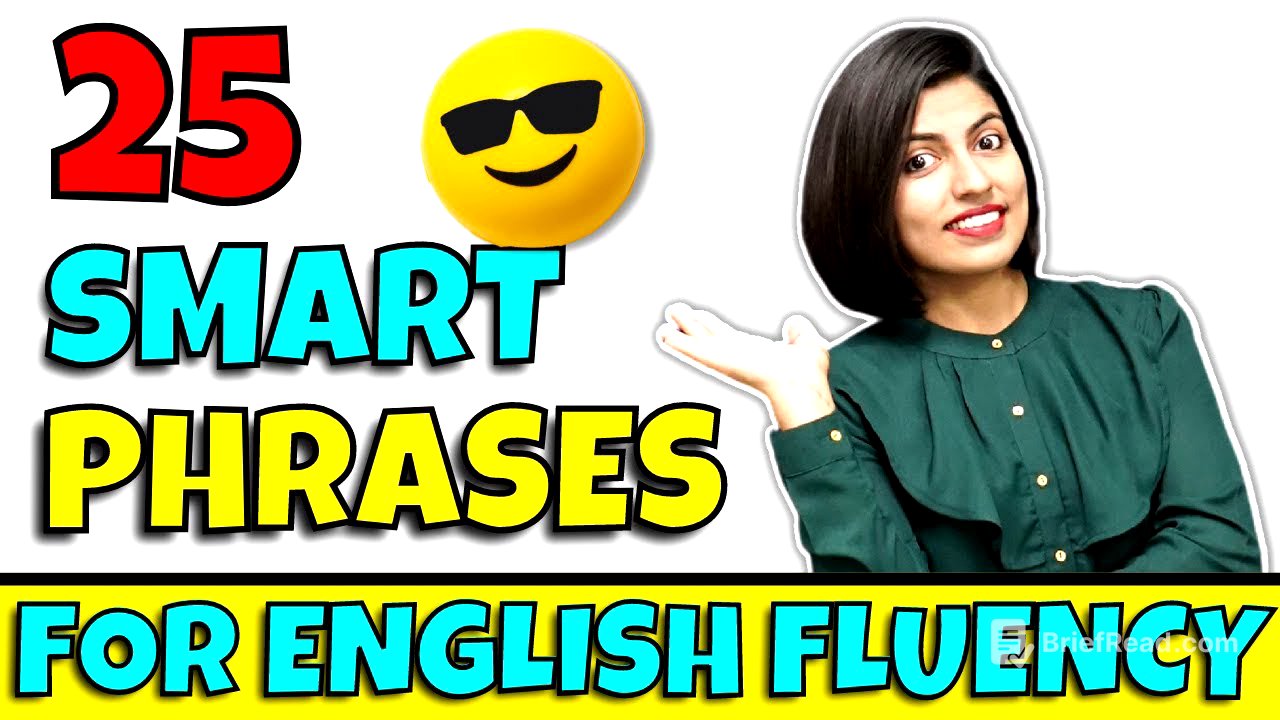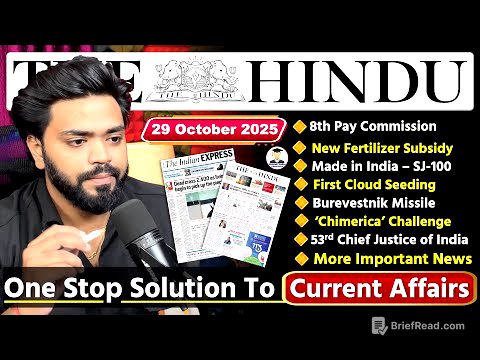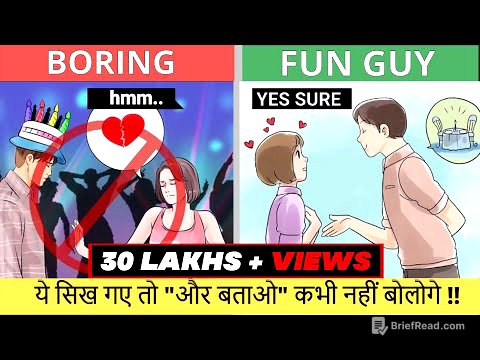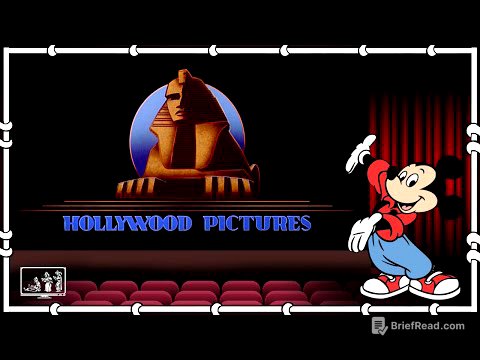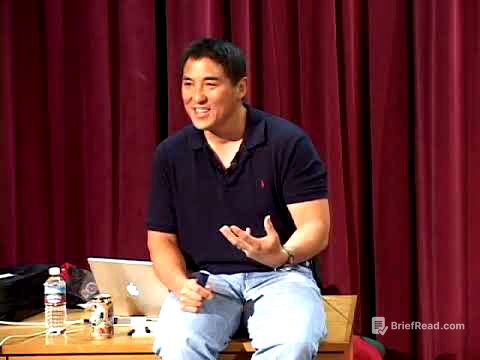TLDR;
This video by English Connection focuses on enhancing spoken English by using smart phrases that native speakers commonly use. It emphasizes that learning and using these phrases is like applying "makeup" to your English, making it more attractive and effective. The video covers 22 smart English phrases, explaining their meanings and providing examples of how to use them in everyday conversations.
- Introduces 22 smart English phrases for effective communication.
- Provides clear explanations and contextual examples for each phrase.
- Encourages viewers to incorporate these phrases into their daily conversations to sound more fluent.
Smart English Phrases [0:00]
The video introduces the concept of using smart English phrases to enhance one's spoken English, comparing it to applying makeup to make it more appealing. It encourages viewers to adopt these phrases to improve their communication skills and make a better impression. The video promises that learning these phrases will help viewers sound more like native speakers and boost their confidence in English conversations.
I don't buy it. [2:26]
"I don't buy it" doesn't literally mean purchasing something; instead, it expresses disbelief. It's used when someone doesn't believe what they're hearing. For example, if someone claims they didn't do something, but you find it hard to believe, you can respond with "I don't buy it."
Why so blue? [2:48]
"Why so blue?" is a phrase used to ask someone why they are feeling sad. It's a gentle way of inquiring about someone's unhappiness or low spirits. For instance, if you notice a friend looking downcast, you might ask, "Why so blue? Is everything okay?"
I beg to differ. [3:21]
"I beg to differ" is a polite way to express disagreement. It's a more formal and courteous way of saying "I disagree." This phrase is suitable for situations where you want to challenge someone's opinion without being confrontational.
If you insist. [3:53]
"If you insist" is used when you reluctantly agree to something someone is strongly urging you to do. It implies that you are giving in to their persistence. For example, if someone keeps offering you something, you might say "If you insist" before accepting.
What's eating you? [4:14]
"What's eating you?" is a question asked when someone looks worried or troubled. It's an informal way of asking what's bothering them. If a person appears very sad or preoccupied, you can ask, "What's eating you?" to find out what's wrong.
I told you so. [4:38]
"I told you so" is used when something happens that you predicted, especially if you warned someone about it beforehand. It can come across as smug, so it's often used cautiously. For instance, if you advised someone against a decision and it backfires, you might say, "I told you so."
Don't sweat it. [4:58]
"Don't sweat it" means "don't worry about it." It's a way of telling someone not to stress over something that has happened or might happen. For example, if someone is anxious about a minor mistake, you can say, "Don't sweat it; it's not a big deal."
You bet [5:16]
"You bet" is an informal way of saying "definitely" or "absolutely." It's used to express strong agreement or confirmation. For instance, if someone asks if you'll help them, you can reply with "You bet!" to show your willingness.
Coming right up. [5:43]
"Coming right up" is a phrase used to indicate that something will be provided or delivered immediately. It's commonly used in service settings, like restaurants or hotels. If you order something, the server might say, "Coming right up" to assure you it will be prepared quickly.
I messed up. [5:59]
"I messed up" means "I made a mistake." It's a straightforward way of admitting fault or error. If you realize you've done something wrong, you can say, "I messed up" to take responsibility.
What a small world! [6:17]
"What a small world!" is exclaimed when you encounter a surprising coincidence, such as meeting someone unexpectedly or discovering a connection between people or places. It expresses astonishment at how interconnected things can be.
Sure thing. [6:52]
"Sure thing" is a casual way of saying "yes" or "of course." It indicates willingness to do something. If someone asks for a favor, you can respond with "Sure thing" to show you're happy to help.
Don't be a stranger. [7:14]
"Don't be a stranger" is a friendly way of saying "keep in touch." It's used when parting ways with someone you want to see again in the future. It encourages them to stay connected and not lose contact.
It's written all over your face. [7:42]
"It's written all over your face" means that your feelings or thoughts are evident from your facial expressions. It suggests that your emotions are easily readable by others. If someone suspects you're sad, they might say, "It's written all over your face."
Cat got your tongue? [8:14]
"Cat got your tongue?" is a playful question asked when someone is unusually silent or unable to speak. It implies that they are either shy, speechless, or unwilling to talk.
I'm sick of it. [8:34]
"I'm sick of it" expresses that you are tired and annoyed with something. It indicates a strong feeling of frustration or boredom. If you're fed up with a situation, you can say, "I'm sick of it."
Keep me in the loop. [8:54]
"Keep me in the loop" means "keep me informed." It's a request to be updated on the progress or developments of a project or situation. If you want to stay informed, you can ask someone to "keep me in the loop."
You made it. [9:23]
"You made it" is an expression of congratulations, typically used when someone has achieved a goal or succeeded in something challenging. It acknowledges their accomplishment and effort.
You Never Know. [9:44]
"You never know" suggests that anything is possible and that outcomes are uncertain. It's used to express that future events are unpredictable. For example, "He may change his mind, you never know."
No Sweat [10:01]
"No sweat" means "no problem" or "it's easy." It's a casual way of saying that something can be done without difficulty. If someone asks for a small favor, you can reply with "No sweat."
It's a Deal [10:21]
"It's a deal" signifies an agreement. It confirms that both parties have accepted the terms of an offer. It's often used in business or transactional contexts to finalize an arrangement.
Take it easy [10:47]
"Take it easy" means "relax" or "don't stress." It's a way of advising someone to calm down or not to overexert themselves. It can also be used as a farewell, meaning "goodbye" or "take care."
What's going on? [11:03]
"What's going on?" is a question used to inquire about current events or activities. It's a general way of asking what is happening or what the situation is.
Get to the Point. [11:15]
"Get to the point" is an instruction to be direct and avoid unnecessary details. It's used when someone is being verbose or unclear, and you want them to state the main issue or information.
Beats Me. [11:36]
"Beats me" means "I don't know." It's an informal way of admitting ignorance or uncertainty about something. If someone asks you a question you can't answer, you can reply with "Beats me."
English by Kanchan Ma'am [11:56]
The video concludes by encouraging viewers to share the video with friends and family to promote collaborative learning. It reinforces the idea that collective progress leads to national advancement. The presenter expresses gratitude and anticipates meeting viewers in the next video.
